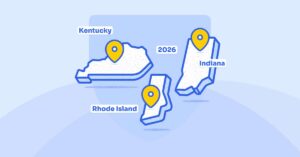Introduction
Andorra’s Qualified Personal Data Protection Law (LQPD) took effect on May 17, 2022. This regulation, replacing the 2003 law, signifies a critical step in adapting to evolving digital challenges and aligning with international data protection standards. The LQPD introduces new rights for Andorran residents and imposes obligations on entities involved in data processing activities. The Andorran Data Protection Agency announced the law’s entry into force, highlighting its significance in enhancing data protection practices within the principality. The law aligns closely with the EU’s General Data Protection Regulation (GDPR), ensuring that Andorra’s data protection laws align with international standards.
Since its enactment, the LQPD has remained relatively stable, with no significant changes or amendments made to the law. However, the Andorran Data Protection Agency (APDA) has been established to oversee the implementation and enforcement of the LQPD and provide guidance to organizations on its requirements. The APDA has also conducted audits and inspections of organizations to ensure compliance with the LQPD and has issued fines to violators of the law.
This article explores the key aspects of the LQPD, shedding light on its principles, implementation, and impact on data protection in Andorra. We will discuss the law’s alignment with the GDPR, its key principles, and how it has impacted data protection in Andorra. Overall, the LQPD has played a vital role in protecting individuals’ privacy and personal data in Andorra, promoting trust and confidence in the digital economy.
Understanding the Andorran Data Protection Agency
Andorra has a well-established data protection framework, with the Andorran Data Protection Agency at its core. As an independent supervisory authority, the agency oversees public and private entities’ compliance with the Andorran Data Protection Law or LQPD. This ensures that all organizations operating within the country adhere to the established data protection regulations and uphold the principles outlined in LQPD.
The agency plays a critical role in safeguarding the rights of data subjects, including protecting their data from unauthorized access, use, or disclosure. In addition, the agency works to promote transparency and accountability in data processing activities and to educate individuals and organizations on best practices for data protection. Overall, the Andorran Data Protection Agency is vital to Andorra’s commitment to ensuring the privacy and security of its citizens’ personal information.
Personal data protection principles in LQPD
In Andorra, the LQPD has been established to provide comprehensive guidelines for legally processing personal data. These guidelines are similar to the General Data Protection Regulation (GDPR) in their approach towards protecting personal data. The LQPD has laid a strong foundation for responsible data processing practices in Andorra by outlining personal data protection principles.
These principles are designed to ensure the lawful processing of personal data and include transparency, purpose limitation, data minimization, accuracy, storage limitation, integrity, and confidentiality. Adherence to these principles is critical for ensuring that personal data is processed responsibly and ethically while safeguarding individuals’ privacy rights. By following these guidelines, organizations can establish a culture of trust, transparency, and accountability, thereby fostering a positive relationship with their customers.
Data controllers and their responsibilities
Under the LQPD, data controllers have a crucial role to play. They are responsible for ensuring all data processing activities comply with the law. This involves obtaining explicit consent from the data subject, implementing appropriate security measures to prevent unauthorized access, and defining the purposes for which the personal data will be processed.
Furthermore, data controllers are legally required to act transparently and ethically in all their data processing practices. This means they must provide clear information to data subjects about how their data will be used and be accountable for data privacy breaches. They also must ensure that the personal data they collect is accurate, up-to-date, and always kept secure.
In summary, data controllers play a critical role in upholding the principles of the LQPD. They must act with integrity, transparency, and accountability and ensure that all data processing activities are lawful and ethical.

The role of Data Protection Officers (DPOs)
As per the requirements introduced by the LQPD, it is now mandatory for organizations to appoint a Data Protection Officer (DPO). This individual is designated to oversee the organization’s data protection compliance, conduct impact assessments, and act as a point of contact for data subjects. The DPO ensures that the organization remains accountable for safeguarding personal data and is responsible for implementing and maintaining the organization’s data protection policies and procedures.
Additionally, the DPO guides the organization on data privacy laws and regulations and ensures that the organization remains up-to-date on any changes to these laws. The appointment of DPOs enhances organizations’ accountability level in protecting personal data, ensuring that data subjects’ rights are respected and protected.
Data subject rights under LQPD
Andorra’s Qualified Personal Data Protection Law (LQPD) aims to grant extensive rights to data subjects, individuals whose personal data is collected and processed by organizations. This aligns with the General Data Protection Regulation’s (GDPR) emphasis on empowering individuals regarding their data. These rights include the right to access the data that an organization is processing, the right to correct any incorrect or incomplete data, and the right to request the erasure of their data where there is no legitimate reason for its continued processing.
In addition to these rights, data subjects have the right to data portability, allowing them to obtain and reuse their data across different services. This means individuals can easily transfer their data from one service provider to another without hindrance.
Furthermore, data subjects have the right to object to certain types of processing, such as direct marketing or profiling, providing them with substantial control over their personal information. This gives individuals a say in how organizations use their data and helps them protect their privacy.
Data Protection Impact Assessments (DPIAs)
LQPD has introduced an innovative requirement for organizations to conduct Data Protection Impact Assessments (DPIAs) in certain situations. These assessments serve as a crucial tool for companies to identify and mitigate risks associated with data processing activities.
By conducting DPIAs, organizations can thoroughly evaluate the potential privacy implications of their data processing activities and ensure that any risks are addressed promptly and effectively. This helps companies comply with data protection regulations but also helps build trust with their customers by demonstrating a commitment to protecting their data.
Handling inaccurate personal data
The LQPD emphasizes the accuracy and integrity of personal data stored by organizations. Organizations must proactively ensure their personal information is accurate, complete, and up-to-date. In cases where inaccurate data is identified, the organization must rectify the information promptly. This is to maintain the integrity of individuals’ personal information and prevent any misuse, unauthorized access, or breach of privacy.
The LQPD also recommends that organizations implement regular checks and audits of their data to identify and rectify any inaccuracies or inconsistencies. This proactive approach ensures compliance with data protection regulations and enhances the trust and confidence of individuals in the organization’s handling of their data.
Responding to personal data breaches
The LQPD has set up well-defined and comprehensive guidelines for managing and addressing personal data breaches. These guidelines require that organizations act promptly and inform both the Andorra Data Protection Agency and any individuals whose data may have been affected in the event of a breach.
By taking this proactive approach, organizations can enhance transparency, ensure adherence to legal requirements, and enable timely corrective actions. This mitigates the risks associated with data breaches and builds trust with customers and stakeholders by demonstrating a commitment to data privacy and security.

International data transfers and LQPD
The LQPD outlines specific guidelines for transferring personal data outside Andorra’s borders. These guidelines place significant emphasis on the need for adequate safeguards to be in place to protect the privacy and security of individuals’ data.
In particular, organizations that engage in international data transfers must comply with the stipulated requirements to ensure that personal data remains protected, even when it is transferred across borders. By adhering to these requirements, organizations can help to ensure that individuals’ data is not misused, mishandled, or otherwise put at risk during the transfer process.
Special considerations for sensitive data
Sensitive data, such as health or genetic information, are given higher protection under the law. Any processing activities that involve such data are subjected to additional scrutiny. This ensures the LQPD can fulfill its commitment to safeguarding individuals’ most private and personal information.
The additional scrutiny is necessary because sensitive data is susceptible to misuse, mishandling, and unauthorized access. The LQPD recognizes the sensitive nature of this information and takes all necessary measures to ensure that it is processed safely and securely.
Data minimization and automated processing
The LQPD is a legal framework that emphasizes the importance of data minimization and transparent decision-making processes when handling personal information. According to the law, organizations should only collect the minimum amount of data necessary for specific purposes and be transparent about how they use and process the collected data.
Furthermore, the LQPD addresses automated systems that impact data subjects. It requires organizations to ensure that their automated processing systems are designed to be transparent, fair, and impartial in their decision-making processes. This means that individuals have the right to know how automated systems work, the logic behind their decisions, and the impact of those decisions on their data.
Overall, the LQPD is a comprehensive regulation that protects individuals’ personal information by promoting responsible data-handling practices and ensuring that automated systems are transparent and fair in their decision-making processes.
Legal grounds for processing personal data
Data protection laws, such as the General Data Protection Regulation (GDPR), specify various legal grounds for processing personal data. These legal grounds help ensure that organizations only process data with a legitimate reason. Whether based on the data subject’s consent, contractual relationships, legal obligations, or other lawful bases, such as legitimate interests, the GDPR provides a clear framework for lawful data processing.
This framework ensures that organizations are transparent in their data processing activities and that individuals’ rights are protected. By following this framework, organizations can build customer trust and maintain compliance with data protection regulations.
Storage period and deletion of personal data
The LQPD regulations have set specific guidelines on how long organizations can store personal data. These guidelines are in place to encourage responsible data management and prevent the misuse or mishandling of personal information. Organizations are required to adhere to the stipulated timelines. They must ensure that any personal data that is no longer necessary for the purposes for which it was collected is securely deleted.
Failure to comply with these regulations can result in legal consequences and a loss of trust from customers or clients. Therefore, it is important for organizations to have a comprehensive understanding of the LQPD regulations and to implement secure data management practices to protect the privacy and security of personal information.

Handling professional data and direct marketing purposes
The legal framework governing data processing activities delves into the intricacies of managing professional data, which pertains to information related to individuals in their capacity as professionals. This particular data category is accorded special treatment, as it is distinct from personal data. Andorra’s Qualified Personal Data Protection Law (LQPD) also sets out specific provisions for direct marketing practices.
Organizations must seek explicit consent from individuals before using their data for such purposes. This measure aims to safeguard the privacy and autonomy of individuals, particularly in the context of commercial activities involving personal data use.
Withdrawing consent and data subject rights
To ensure that data processing activities are conducted ethically and responsibly, the LQPD emphasizes the need for organizations to obtain valid consent from data subjects. This means that individuals should be provided with clear and transparent information about how their data will be collected, processed, and shared. Furthermore, data subjects should have the right to withdraw their consent without facing any negative consequences.
This approach aligns with the broader theme of empowering data subjects and is an important step toward ensuring individuals maintain control over their personal information. By giving data subjects the ability to make informed choices about how their data is used, organizations can build trust and establish strong relationships with their customers. Additionally, this approach can help reduce the risk of data breaches and other security incidents, as individuals are more likely to be vigilant about how their data is handled.
Regulatory framework and financial fines
The regulatory framework established by LQPD includes provisions for financial fines in cases of non-compliance. Andorra’s Qualified Personal Data Protection Law (LQPD) empowers the Andorra Data Protection Agency (APDA) to issue warnings and impose financial fines on private organizations for non-compliance with data protection regulations. The fines are based on the severity of violations, with different amounts prescribed for varying offenses.
According to key takeaways from the law, fines for minor violations can range from €500 to €15,000. This provides a clear framework for organizations to understand the potential financial consequences of non-compliance with LQPD. Private entities must adhere to the stipulated data protection regulations to avoid financial penalties and ensure the security and privacy of personal data. The fines are designed to enforce compliance and act as a deterrent against negligent or irresponsible handling of individuals’ data within Andorra.
Conclusion
In conclusion, Andorra’s Qualified Personal Data Protection Law (LQPD) establishes a comprehensive and robust framework for safeguarding personal data. The law aligns with international standards, particularly the GDPR, reflecting Andorra’s commitment to upholding the privacy rights of its citizens and ensuring responsible data processing practices. Organizations operating in Andorra must navigate the intricacies of LQPD to ensure compliance and contribute to a data protection landscape that prioritizes transparency, accountability, and individual rights.




